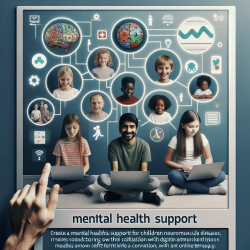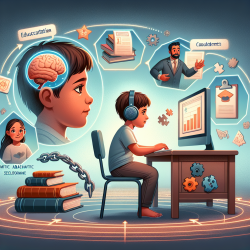The study titled "Mental health challenges and digital platform opportunities in patients and families affected by pediatric neuromuscular diseases - experiences from Switzerland" provides valuable insights for practitioners working with children diagnosed with neuromuscular diseases (NMD). This blog aims to highlight the key findings of the study and suggest practical ways to integrate these findings into clinical practice to enhance mental health support for affected families.
Key Findings from the Research
The research identifies several mental health challenges faced by patients and families dealing with pediatric neuromuscular diseases. These challenges include:
- Psychosocial stressors related to the progressive nature of NMD.
- Social exclusion and stigma experienced by patients and their families.
- Care-related burdens that lead to emotional and psychological strain.
- Structural and financial challenges in accessing care and support.
- Barriers in public places and transit that limit mobility and independence.
Implementing Research Outcomes in Clinical Practice
To address these challenges, the study suggests leveraging digital platforms to provide comprehensive mental health support. Here are some actionable steps practitioners can take:
1. Utilize Digital Platforms for Social and Professional Support
Digital platforms can offer social and professional support through features like peer-support groups, messaging services, and organizational tools for daily planning and medication management. Practitioners can recommend these platforms to families to help them connect with others facing similar challenges.
2. Ensure Credibility and Trust in Online Information
It is crucial to provide families with access to verified, centralized, and continuously updated information on NMD. Practitioners should guide families towards reliable digital resources that offer expert-guided information on disease progression, treatment options, and support services.
3. Address Privacy and Informed Consent Concerns
Privacy is a significant concern when using digital platforms. Practitioners should ensure that the platforms they recommend have clear and transparent privacy policies. Educating families about the importance of informed consent and how to manage their digital privacy can also help alleviate concerns.
Encouraging Further Research
The study highlights the need for further research on the suitability of digital platforms to promote resilience in families affected by NMD. Practitioners are encouraged to participate in or initiate research projects that explore the effectiveness of digital interventions in improving mental health outcomes for these families.
By integrating the findings from this study into clinical practice, practitioners can significantly enhance the mental health support provided to children with neuromuscular diseases and their families.
To read the original research paper, please follow this link: Mental health challenges and digital platform opportunities in patients and families affected by pediatric neuromuscular diseases - experiences from Switzerland.










